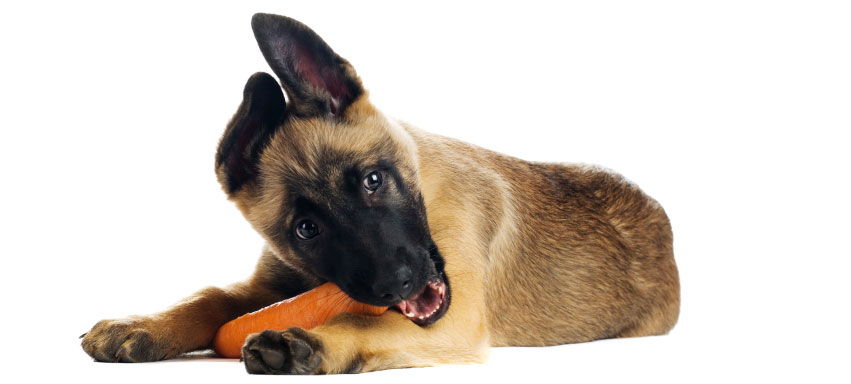Large bred puppy foods are highly recommended for all dogs whose mature weight is probably going to be over 25 kgs or 50 lbs and especially those genetically pre-dispositioned to hip dysplasia. Giant breeds such as Great Danes, Irish wolfhounds, and giant schnauzers have unique dietary requirements. Very few commercial puppy foods offer the ideal mix of calcium, energy, and protein levels that these breeds need. We can provide you with feeding recommendations that will encourage your dog’s maximum growth potential without causing developmental problems. For added convenience, we also stock veterinary-approved diets for large breeds.
Just like human children, puppies do best with a properly balanced diet of nutrients, protein, carbohydrates, and fat. However dogs vary in size way more than people do and need “size-specific” diets. Great Dane pups grow much faster than Chihuahuas so they should eat different foods. Regardless of size, pups need high energy foods because they expend a lot of energy. They are constantly on the move and burn more calories. Caloric requirements increase drastically during the first 12 months of life, but they need to be regulated. Too many calories leads to obesity later in life which also causes orthopedic problems.
How fast a pup grows has to be carefully regulated. Large breed pups grow A LOT! But they should not grow up too fast. About half of the calories that pups consume are used in tissue growth and skeletal development. These calories must come from a balanced diet that promotes healthy bone and muscle growth. Feeding a diet that is too calorically dense (high in fat) can make a pup grow faster than his bones can accommodate resulting in skeletal abnormalities.
Protein content is also crucial. Proteins are the basic building blocks of the body and contribute to healthy muscle development. Growing pups need more protein than adult dogs. On the flip side, too much protein can be detrimental to healthy growth and result in an imbalance of calcium and phosphorus which can negatively affect bone and joint development.
Calcium is needed for strong bones, but is harmful in excess. Pups, unlike adult dogs, cannot adequately regulate how much dietary calcium they absorb from the intestinal tract. Sometimes they absorb and retain too much calcium which can cause skeletal malformations.
Excess calcium also causes deficiencies in other needed nutrients, like phosphorus. Calcium and phosphorus work together and a proper calcium to phosphorus ratio is important for healthy bones and joints. The calcium:phohphorus ratios in your pup’s diet should be between 1:1 and 1.3: Large breed pups eating balanced diets containing recommended amounts of calcium should not be given calcium supplements. Your veterinarian can suggest diets that meet this standard.
Other vitamins and minerals impact skeletal development. Vitamin D, vitamin A, copper, zinc, and manganese are essential to healthy bones. Deficiency or excess of these nutrients may also contribute to abnormal orthopedic development.
In general, giant breed puppy foods should be lower in fat, have a good calcium content, an appropriate Ca:P ratio, and provide high quality protein. The calcium content should be around 1.5% (or 3 grams/1,000 kcal). Large and giant breed pups should consume diets that contain at least 30% high quality protein and 9% fat (dry matter basis). Remember that protein quality varies with the source, so high quality foods may cost more.
If you give your pup treats, consider the calories they add to the diet. Choose low carbohydrate treats that do not contain added calcium. Fruits and vegetables are healthy treat alternatives that add few calories to the diet. Avoid toxic fruits and vegetables such as grapes, raisins, and onions.
“Fruits and vegetables are healthy treat alternatives that add few calories to the diet.”
Please don’t hesitate to contact us by phone at 780-352-7006 or email us at info@wacvet.ca if you have any concerns regarding your dog’s nutrition or if you would simply like to discuss this topic with us.

